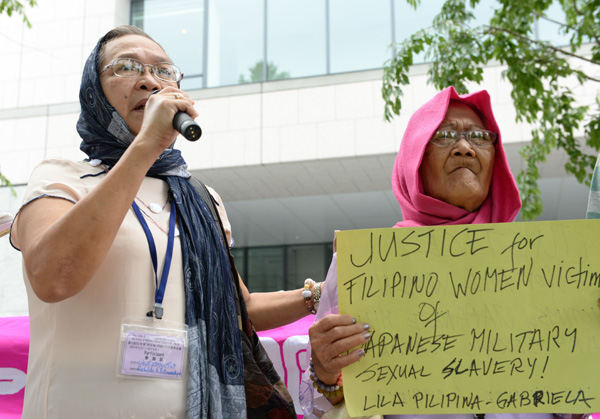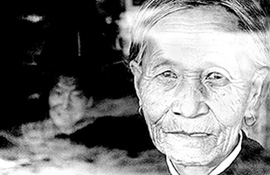 |
|
Filipino representatives of the victims of the Japanese sex crimes during the war call for justice during a rally in Tokyo in June. Ma Ping / Xinhua |
Support from West
|
 |
| Special: Tragedy of 'Comfort Women' |
|
Experts' view: Three experts have called for Japan to recognize its war crimes, as they speak to reporterHe Na. Widespread abuse
It's my understanding that the Japanese did this wherever they were, including Korea, China, Indonesia and the Philippines. In Indonesia, they forced Dutch women into this service. As far as how Westerners perceive this by Japan, I believe that mostly they are unaware. I believe that Japan has good public relations which they hide behind so that they do not have to ever accept responsibility for what they did. Do not overlook the "medical" studies they did on Chinese in China. I also believe that, over history, attackers and invaders always targeted women as part of their strategy. Look at Nigeria today. Japan did this as part of their government strategy and part of their cultural arrogance. Japan used "slaves" during WWII, men and women. Look at the soldiers captured in Hong Kong who were used as slaves. Of course, Germany did the same with the Jewish people. However, the German government has since admitted this. Japan is still "innocent" in their eyes. Edmund Pearson, 78, is a Canadian engineer and businessman, who was among the foreign internees in a Japanese camp in Weifang, Shandong province, during WWII. |
Besides official support, more foreign NGOs, researchers and others have expressed shock.
"It's a well-known fact in the West that the Japanese abused comfort women in various countries they conquered. People in North America believe it to be the absolute truth," said Angela Elliott, a Canadian writer who was among the foreign internees of a Japanese camp in Weifang, Shandong province, during World War II.
"It has been so many years, and they still will not pay compensation. The women must have suffered beyond imagination and barely survived with so much abuse. There is no excuse for dismissing the charge," she said.
"Words cannot describe what these women had to go through and what makes it worse is Japan's refusal to rectify the actions," Elliott said.
She suggested that readers read a book called The Comfort Women by George Hicks, who describes the Japanese actions as bestial.
The Washington Coalition for Comfort Women Issues said the Japanese government must clearly acknowledge its responsibility for the crimes against the comfort women and should officially apologize to these victims. It must also provide redress for the crimes from government sources and not from the so-called Private Fund.
"I often receive foreign visiting groups to our center. The latest one was in early July consisting of US teachers, students and citizens. They showed great interest in the comfort women issue. One high school teacher from New Jersey told me she felt that the issue is very important, and she will give her students a special lesson on it," said Su, the research center director.
"It is a shame that Japan shirks responsibility for its actions during WWII, and I am surprised that there wasn't greater reaction to their atrocities, including forced sex slaves, before this time," said Chris Hagen, a former journalist for the Gaston Gazette in North Carolina, US, who lived in Tianjin for many years before 1949.
"It angers me that Japan refuses to apologize, and little or no compensation has come from them," he said.
"I can honestly say that many of my Chinese friends in Tianjin have a bitter attitude toward the Japanese. Only when Japan recognizes its crimes, begs for forgiveness, and compensation of some sort is given, can the Chinese truly put this part of history behind them, I believe. Shame on Japan. They 'lost the face' of countless generations, and still refuse to do what is morally right."
Most of the comfort women must be gone by now, and the international world is starting to forget. That, too, is a great shame, Hagen said.
David Waller, a professor at the business school at the University of Technology, Sydney, said that in Australia, little was known about comfort women until 2007 when Jan Ruff O'Herne, a former Dutch comfort woman, started speaking out about it.
"It's a difficult subject to discuss, but an important one to help understand the brutality and inhumanity of war. For Australians, it was realized that the women were not just Chinese or Korean, Indonesian or Filipino, but included Dutch women - and in Jan's situation someone still alive and living in Australia," Waller said.
"This was a terrible part of war, but I would encourage further research on this to shine a light on this evil so it will never happen again."
Learning from Germany
In stark contrast, top Japanese government officials often pay visits to the Yasukuni Shrine which honors WWII war criminals.
Mike Bastin, a lecturer at Southampton Solent University, suggested that Japan learn from Germany.
"The topic of comfort women continues to disgust the Western world. The Western world now wants to see a full, public apology from the Japanese and substantial compensation paid by the Japanese government," he said.
"Relations between Germany and other Western nations have developed well partly due to apologies for wartime atrocities by the Germans. The West is still waiting for apologies from the Japanese," Bastin said.
"Sexual violence in wars is not new and regrettably still goes on even today. But the war ended 69 years ago and the truly important thing is to make sure a cataclysmic event cannot happen again," said Steve Tsang, director of the China Policy Institute at the University of Nottingham.
A conflict between China and Japan will be a cataclysmic one, and it must be avoided at all costs, he said.
Contact the writers at hena@chinadaily.com.cn
Han Junhong contributed to this story.
